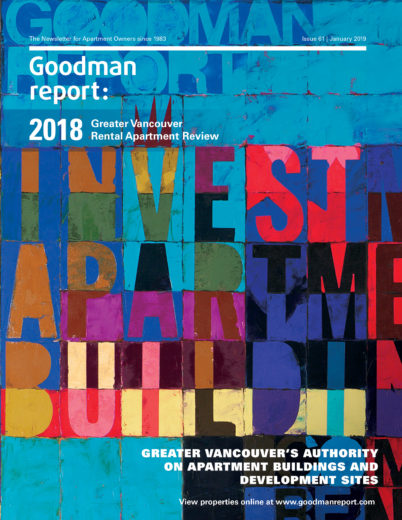“Renoviction” and “demoviction”: Two fake words that may change your world
Goodman Report
Let’s take a closer look at the two leading recommendations of the Task Force. These are key to follow, as they have to do with the obligations of landlords during property improvements that the Task Force claims are displacing tenants.
It’s renovation, not “renoviction”
Recommendation #1 by the Task Force is a two-word directive: “Stop renovictions.”
Sounds simple on the face of it. The intention, in the Task Force’s words, is to prompt lawmakers to give clearer guidance under the RTA to delineate “what accommodations and actions by rental housing providers and tenants are acceptable during renovations.” The idea is to discourage owners from jacking up rents by evicting tenants during cosmetic renovations while making false claims that they’re conducting major renovations. The Task Force asserts that the lack of clear guidance on what constitutes a renovation has left owners and tenants “vulnerable to misinterpretation or abuse of the Act.”
To begin with, we take issue with the word “renovictions.” While a very small proportion of owners may be making cosmetic improvements to achieve higher rents through tenant turnover, the fact is that many multifamily buildings are 50 to 75 years old and desperately need total rehabilitation.
Furthermore, to what extent are renovictions actually happening? According to the Goodman Report’s data, they’re happening much less in the multifamily sector than the Task Force is asserting. In fact, our numbers show that very few tenants are actually being evicted following sales of purpose-built rentals.
We do agree that the RTA lacks the clarity to distinguish upgrades that are legitimate renovations requiring tenant move-out from those which are cosmetic improvements where tenants should be able to stay in place. We support amendments to the RTA that will spell out these differences, for the benefit of both owners and tenants. That said, we object to the demonization of landlords as a group. It’s our experience that the overwhelming majority do their very best to be conscientious owners of their properties having no interest in being featured on CTV News or in the Vancouver Sun for possible wrongdoing.
And it’s redevelopment, not “demoviction”
Ratcheting up in scale from renovation to redevelopment, Recommendation #2 calls upon the province to work with local governments to create tenant compensation and relocation guidelines. The intention is to reduce dislocation and homelessness when purpose-built rentals get demolished for redevelopment.
In Burnaby it’s total chaos. A number of major projects that were ready to proceed have been shut down. Under the new mayor Mike Hurley, Council has declared a moratorium on redevelopment in Metrotown pending completion in June 2019 of a report by the city’s housing task force.
Regarding the language on redevelopment, we have three layers of concern. First, redevelopments don’t happen in individual isolation as the result of developer whim. They occur within the context of comprehensive visions for municipalities set out in official community plans (OCPs). This being the case, if approvals are granted or withheld in haphazard or piecemeal ways without regard to planning as set out in an OCP, developers and owners have to cope with major uncertainty that can remove the commercial incentive to invest in much-needed new housing supply.
Second, Recommendation #2 leaves it unclear what suggested timeline the province will follow as it produces more specific guidelines on redevelopment. This too increases uncertainty for owners and investors.
Finally, as with the word “renoviction,” we take exception to the word “demoviction” as it is dangerous language that scapegoats an entire group of owners and investors. While we agree on the need to move forward with clarifying the RTA, we’d be remiss in failing to comment on language that misrepresents the realities of providing rental accommodation.
As always, the Goodman Report prides itself on being a voice of clarity and reason, providing the facts you need to know while advocating for your business.
